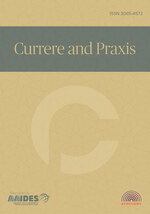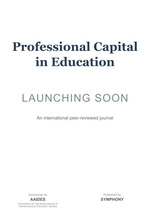Social media orientation of local and global values in the Saudi Arabian context
DOI:
https://doi.org/10.70116/2980274185Keywords:
Social media orientation, top-down globalization, Saudi Arabia, fourth ındustrial revolution, values education and clarificationAbstract
The role of social media in influencing personal norms and values has rarely been examined. This position paper addresses the impact of the flood of global values arising from top-down globalization and Western hegemony on Saudi Arabia’s (SA) locality (i.e., religion, culture, and language). Using a neologism coined for this paper – social media orientation (i.e., how values are oriented and perpetuated via social media) – the issue was anchored within the Fourth Industrial Revolution (4IR) with its focus on technological innovation especially social media platforms. I focused on what can be done to preserve SA’s locality in the face of social media orientation to avoid being swept up in the flood of global values that contradicts Islam’s core value system and SA’s core culture and rich heritage. After profiling SA’s locality (Islamic religion, Hofstede’s cultural profile, and the Arabic language), and Saudi’s social media usage patterns, I shared my opinion on how best to protect the locality. The next generation must become flood resilient, so youth can lessen the risk the flood of global values poses for Saudi citizens and the Saudi religious/cultural/language infrastructure and view the flood as a chance to analyze, clarify, and adjust values. Pushback against a juggernaut empowered by social media orientation is possible if the momentum is reframed as an opportunity to leverage the local to redirect the flood to benefit Saudi’s cultural heritage and economic future.
Downloads
References
Affect vs. influence vs. impact. (2020). In LanGeek Language Learning Platform. Retrieved 10.22, 2023 from https://langeek.co/en/grammar/course/1784/affect-vs-influence-vs-impact
Ahmed, O. (2023, August 6). Will Saudi Arabia make Friday a working day? Middle East Monitor. Retrieved 09.10.2023 from https://www.middleeastmonitor.com/20230806-will-saudi-arabia-make-friday-a-working-day/
Alghamdi Hamdan, A. K., & Aldossari, A. T. (2021). Debate learning strategy in female postgraduate school: A Saudi case study. Issues in Educational Research, 31( 2), 327-347. https://doi.org/10.3316/informit.05280017298205
Alghamdi Hamdan, A. K., & Mustafa, R. F. (2021). Saudi women EFL learners’ expressing guilt and defiance discourses: Evolving their gendered identities. Issues in Educational Research, 31(4), 1007-1028. http://www.iier.org.au/iier31/alghamdi-hamdan2.pdf
Al-Gouth, M. (2021). [The cold war on the Arab identity, language, creativity, and education]. Bank Library Publishing.
Alhazmi, A., & Nyland, B. (2013). The Saudi Arabian international student experience: From a gender-segregated society to studying in a mixed-gender environment. Compare: A Journal of Comparative and International Education, 43(3), 346-365. https://doi.org/10.1080/03057925.2012.722347 DOI: https://doi.org/10.1080/03057925.2012.722347
Al-Jarf, R. (2019, March 29–30). Effect of social media on Arabic language attrition. Paper presented at the Globalization, Language, Literature, and the Humanities Conference, Abuja, Nigeria. Retrieved 02.12.2022 from https://files.eric.ed.gov/fulltext/ED614077.pdf
Al-Jarf, R. (2020). [Should we teach English to children under the age of six?]. Eurasian Arabic Studies, 9, 65-97. https://cyberleninka.ru/article/n/should-we-teach-english-to-children-under-the-age-of-six/viewer
Al-Jarf, R. (2023). Non-conventional spelling in informal, colloquial Arabic writing in Facebook. International Journal of Linguistics, Literature and Translation, 6(4), 35-47. https://doi.org/10.32996/ijllt.2023.6.4.6 DOI: https://doi.org/10.32996/ijllt.2023.6.4.6
Al-Khamshi, J. S., Al-Assaf, A. A. M., & Junaid, A. M. H. (2023). [The impact of social networking on youth in Saudi society: A field study on a sample of youth]. Journal of Social Research and Studies, 3(1), 142-188. https://www.rssj.org/index.php/rssj/article/view/114
Alkharusi, M. J. (2013). The intercultural communication experiences of Arab Muslims studying in New Zealand: Academic and social perspectives (Unpublished doctoral dissertation). University of Waikato, New Zealand. Retrieved 02.12.2022 from https://hdl.handle.net/10289/8309
Alrabai, F. (2018). Learning English in Saudi Arabia. In C. Moskovsky & M. Picard (Eds.), English as a foreign language in Saudi Arabia (1st ed.) (pp. 102–119). Routledge. DOI: https://doi.org/10.4324/9781315688466-5
Alsweel, R. A. (2013). The impact of English as a second language on Saudi women’s roles and identities (Unpublished doctoral dissertation). George Mason University, Fairfax. Retrieved 02.12.2022 from http://mars.gmu.edu/handle/1920/8085
Asharq Al-Awsat News. (2023, October 9). Saudi Arabia launches new platform to promote Saudi culture globally, locally. Retrieved 02.12.2022 from https://english.ajel.sa/lifestyle/saudi-arabia-launches-new-platform-to-promote-saudi-culture-globally-locally
Assad, S. W. (2007). The rise of consumerism in Saudi Arabian society. International Journal of Commerce and Management, 17(1/2), 73-104. https://doi.org/10.1108/10569210710774767 DOI: https://doi.org/10.1108/10569210710774767
BBC Arabia. (2013, June 18). Why did Saudis record the highest global growth in the use of Twitter? Retrieved 02.12.2022 from https://www.bbc.com/arabic/interactivity/2013/06/130617_comments_saudi_highest_twitter
Chaffey, D. (2023, June 7). Global social media statistics research summary 2023 [Web log post]. Retrieved 02.12.2022 from https://www.smartinsights.com/social-media-marketing/social-media-strategy/new-global-social-media-research/
David, N. (2016, January 19). What is the fourth industrial revolution? [Web log post]. World Economics Forum. Retrieved 02.12.2022 from https://www.weforum.org/agenda/2016/01/what-is-the-fourth-industrial-revolution/
Dutot, V., & Bergeron, F. (2016). From strategic orientation to social media orientation: Improving SMEs’ performance on social media. Journal of Small Business and Enterprise Development, 23(4), 1165–1190. https://doi.org/10.1108/JSBED-11-2015-0160 DOI: https://doi.org/10.1108/JSBED-11-2015-0160
Faisal, A., Hermawan, A., & Arafah, W. (2018). The influence of strategic orientation on firm performance mediated by social media orientation at MSMEs. International Journal of Science and Engineering Invention, 4(08), 22–31. https://doi.org/10.23958/ijsei/vol04-i08/03 DOI: https://doi.org/10.23958/ijsei/vol04-i08/03
General Authority for Statistics. (2019). Social youth development survey bulletin. Riyadh, Saudi Arabia. https://www.stats.gov.sa/sites/default/files/saudi_youth_develpment_survey_bulletin_en.pdf
Ghafar, Z. (2024). The positive and negative aspects of social media platforms in many fields, academic and non-academic, all over the world in the digital era: A critical review. Journal of Digital Learning and Distance Education, 2(9), 707–721. https://doi.org/10.56778/jdlde.v2i8.212 DOI: https://doi.org/10.56778/jdlde.v2i8.212
GMI Blogger. (2023, March 6). Saudi Arabia social media statistics 2023 [Web log post]. Retrieved 02.12.2022 from https://www.globalmediainsight.com/blog/saudi-arabia-social-media-statistics/
Gramsci, A. (1985). Selections from cultural writings (W. Q. Boelhower, D. Forgacs & G. Nowell Smith, Trans.). Lawrence and Wishart.
Grigs. (2023). To what extent does social media shape our values? Quora Forum. Retrieved 02.12.2022 from https://www.quora.com/To-what-extent-does-social-media-shape-our-values
Guerlain, P. (1997). The ironies and dilemmas of America’s cultural dominance: A transcultural approach. American Studies International, 35(2), 30-51. http://www.jstor.org/stable/41279482
Hamdan, A. (2012). The role of authentic Islam: The way forward for women in Saudi Arabia. Hawwa, 10(3), 200-220. https://doi.org/10.1163/15692086-12341237 DOI: https://doi.org/10.1163/15692086-12341237
Heyn, M. E. (2013). Experiences of male Saudi Arabian international students in the United States (Unpublished doctoral dissertation). Western Michigan University, Kalamazoo. Retrieved 02.12.2022 from https://scholarworks.wmich.edu/dissertations/16 DOI: https://doi.org/10.1037/e579632013-001
Hofstede, G. (2011). Dimensionalizing cultures: The Hofstede model in context. Online Readings in Psychology and Culture, 2(1), Article 8. https://doi.org/10.9707/2307-0919.1014 DOI: https://doi.org/10.9707/2307-0919.1014
Hofstede, G. (2015). Country comparison graphs. Retrieved 02.12.2022 from https://geerthofstede.com/country-comparison-graphs/
Hofstede, G., Hofstede, G. J., & Minkov, M. (2010). Cultures and organizations: Software of the mind (3rd ed.). McGraw-Hill.
Hsu, T. W., Niiya, Y., Thelwall, M., Ko, M., Knutson, B., & Tsai, J. L. (2021). Social media users produce more affect that supports cultural values, but are more influenced by affect that violates cultural values. Journal of Personality and Social Psychology, 121(5), 969-983. https://doi.org/10.1037/pspa0000282 DOI: https://doi.org/10.1037/pspa0000282
Hynes, N., & Wilson, J. (2016). I do it, but don't tell anyone! Personal values, personal and social norms: Can social media play a role in changing pro-environmental behaviours? Technological Forecasting and Social Change, 111, 349-359. https://doi.org/10.1016/j.techfore.2016.06.034 DOI: https://doi.org/10.1016/j.techfore.2016.06.034
Jiang, G., Garris, C. P., & Aldamer, S. (2018). Individualism behind collectivism: A reflection from Saudi volunteers. VOLUNTAS International Journal of Voluntary and Nonprofit Organizations, 29, 144-159. https://doi.org/10.1007/s11266-017-9872-y DOI: https://doi.org/10.1007/s11266-017-9872-y
Keane, W. (1997). Knowing one's place: National language and the idea of the local in eastern Indonesia. Cultural Anthropology, 12(1), 37-63. https://www.jstor.org/stable/656613 DOI: https://doi.org/10.1525/can.1997.12.1.37
Kingdom of Saudi Arabia. (2016). Saudi Vision 2030. https://www.vision2030.gov.sa/media/rc0b5oy1/saudi_vision203.pdf
McGregor, S. L. T. (2017). Consumer perceptions of responsibility. In G. Emilien, R. Weitkunat, & F. Lüdicke (Eds.), Consumer perception of product risks and benefits (pp. 567-596). Springer. DOI: https://doi.org/10.1007/978-3-319-50530-5_30
McGregor, S. L. T. (2018). Understanding and evaluating research. SAGE. DOI: https://doi.org/10.4135/9781071802656
McGregor, S. L. T., & Hamdan Alghamdi, A. K. (2022). Women’s role in nation building: Socializing Saudi female preservice teachers into leadership roles. School Leadership and Management, 42(5), 520-542. https://doi.org/10.1080/13632434.2022.2137125 DOI: https://doi.org/10.1080/13632434.2022.2137125
McLean, G. N. (2011). Writing theory, conceptual, and position articles for publication. In T. S. Rocco & T. Hatcher (Eds.), The handbook of scholarly writing and publishing (pp. 209-221). Jossey-Bass.
Mihr, A. (2022). Springer briefs in political science: Global governance. Springer. DOI: https://doi.org/10.1007/978-3-031-02108-4
Navarro, V. (Ed.). (2017). Neoliberalism, globalization, and inequalities. Routledge.
Nurunnabi, M. (2017). Transformation from an oil-based economy to a knowledge-based economy in Saudi Arabia: The direction of Saudi Vision 2030. Journal of the Knowledge Economy, 8, 536-564. https://doi.org/10.1007/s13132-017-0479-8 DOI: https://doi.org/10.1007/s13132-017-0479-8
Ogbonna, E., & Harris, L. C. (2014). Organizational cultural perpetuation: A case study of an English premier league football club. British Journal of Management, 25(4), 667-686. https://doi.org/10.1111/1467-8551.12037 DOI: https://doi.org/10.1111/1467-8551.12037
Olmo, B. G. (1976). Value clarification or values analysis? The Clearing House, 50(3), 122-124. https://www.jstor.org/stable/30184843 DOI: https://doi.org/10.1080/00098655.1976.9956926
Pharaon, N. A. (2004). Saudi women and the Muslim state in the twenty-first century. Sex Roles, 51(5-6), 349-366. https://doi.org/10.1023/B:SERS.0000046618.62910.ef DOI: https://doi.org/10.1023/B:SERS.0000046618.62910.ef
Pikos-Sallie, T. J. (2018). The personal and professional benefits and challenges for Saudi academics after postgraduate study abroad: implications for higher education reform in the Kingdom of Saudi Arabia (Unpublished doctoral thesis) Murdoch University, Perth. Retrieved 02.12.2022 from https://researchportal.murdoch.edu.au/esploro/outputs/doctoral/The-personal-and-professional-benefits-and/991005545296907891
Ramos, G. (2020). Prince Sultan Bin Abdulaziz Al Saud Programme for the Arabic Language. UNESCO. Retrieved 02.12.2022 from https://www.unesco.org/en/arabic-language#:~:text=in%20this%20regard%2C%20in%202016,Bin%20Abdulaziz%20Al%20Saud%20Foundation.&text=Arabic%20plays%20a%20major%20role,of%20peace%20and%20mutual%20understanding
Ritzer, G. (2011). The McDonaldization of society. Sage.
Rokeach, M. (1973). The nature of human values. Free Press.
Saadi, R. (2015). Iishkaliat alhuiat walughat altaelim fi almaghrib ['iishkaliat alhuiat walughat altadris bialmaghribi. [The problem of identity and languages of instruction in Morocco.] East Africa Publishing.
Samli, A. C. (2008). Globalization from the bottom up. Springer. DOI: https://doi.org/10.1007/978-0-387-77098-7
Saudi Arabia adopts the Georgian calendar. (2016, December 15). The Economist. https://www.economist.com/middle-east-and-africa/2016/12/15/saudi-arabia-adopts-the-gregorian-calendar
Saudi Ministry of Culture. (2019, March). Our cultural vision for the Kingdom of Saudi Arabia. https://www.moc.gov.sa/assets/MOC_Cultural_Vision_EN_NEW.pdf
Siddiqui, S., & Singh, T. (2016). Social media its impact with positive and negative aspects. International Journal of Computer Applications Technology and Research, 5(2), 71-75. https://jogamayadevicollege.ac.in/uploads/1586197536.pdf. DOI: https://doi.org/10.7753/IJCATR0502.1006
Statista. (2023, June 20). Most used social media platforms in Saudi Arabia in 2022, by share of users. https://www.statista.com/statistics/1318233/saudi-arabia-most-used-social-media-platforms-by-share-of-users/
Su Kim, L. (2003). Exploring the relationship between language, culture and identity. GEMA Online Journal of Language Studies, 3(2). http://ejournal.ukm.my/gema/article/view/212/185
Tang, M. J., & Chan, E. T. (2020). Social media: Influences and impacts on culture. In K. Arai, S. Kapoor, & R. Bhatia (Eds.), Intelligent computing (Vol. 1, pp. 491–501). Springer. DOI: https://doi.org/10.1007/978-3-030-52249-0_33
Trailhead. (2023). Module: The four industrial revolutions. Retrieved 02.12.2022 from https://trailhead.salesforce.com/en/content/learn/modules/learn-about-the-fourth-industrial-revolution/meet-the-three-industrial-revolutions
Wani, H., Abdullah, R., & Chang, L. W. (2015). An Islamic perspective in managing religious diversity. Religions, 6, 642-656. https://doi.org/10.3390/rel6020642 DOI: https://doi.org/10.3390/rel6020642
Wike, R., Silver, L., Fetterolf, J., Huang, C., Austin, S., Clancy, L., & Gubbala, S. (2022). Social media seen as mostly good for democracy across many nations, but U. S. is a major outlier. Washington, DC: Pew Research Center. https://www.pewresearch.org/global/wp-content/uploads/sites/2/2022/12/PG_2022.12.06_Online-Civic-Engagement_REPORT.pdf
Wynbrandt, J. (2004). A brief history of Saudi Arabia (1st ed.). Infobase Publishing.
Yamani, M. (2000). Changed identities: The challenge of the new generation in Saudi Arabia. Royal Institute of International Affairs.
Yazdani, A. (2020). The culture of peace and religious tolerance from an Islamic perspective. Veritas, 47, 151-168. https://www.redalyc.org/articulo.oa?id=291166073007 DOI: https://doi.org/10.4067/S0718-92732020000300151
Yousefzadeh, H. (2018). The Islamic basis for mutual understanding in intercultural communication. Kom, 7(2), 47-67. https://doi.org/10.5937/kom1802047YO DOI: https://doi.org/10.5937/kom1802047Y
Downloads
Published
How to Cite
Issue
Section
License
Copyright (c) 2025 Symphony

This work is licensed under a Creative Commons Attribution 4.0 International License.














